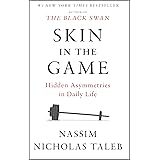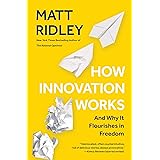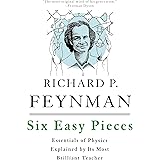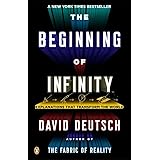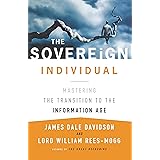




Download the free Kindle app and start reading Kindle books instantly on your smartphone, tablet, or computer - no Kindle device required.
Read instantly on your browser with Kindle for Web.
Using your mobile phone camera - scan the code below and download the Kindle app.

 Audible sample Sample
Audible sample Sample



The Rational Optimist: How Prosperity Evolves Hardcover – May 18, 2010
“Ridley writes with panache, wit, and humor and displays remarkable ingenuity in finding ways to present complicated materials for the lay reader.” — Los Angeles Times
In a bold and provocative interpretation of economic history, Matt Ridley, the New York Times-bestselling author of Genome and The Red Queen, makes the case for an economics of hope, arguing that the benefits of commerce, technology, innovation, and change—what Ridley calls cultural evolution—will inevitably increase human prosperity. Fans of the works of Jared Diamond (Guns, Germs, and Steel), Niall Ferguson (The Ascent of Money), and Thomas Friedman (The World Is Flat) will find much to ponder and enjoy in The Rational Optimist.
-
Print length448 pages
-
LanguageEnglish
-
PublisherHarper
-
Publication dateMay 18, 2010
-
Dimensions6 x 1.37 x 9 inches
-
ISBN-10006145205X
-
ISBN-13978-0061452055
Books with Buzz
Discover the latest buzz-worthy books, from mysteries and romance to humor and nonfiction. Explore more
Similar items that may ship from close to you
-
 At some point, human intelligence became collective and cumulative in a way that happened to no other animal.Highlighted by 1,013 Kindle readers
At some point, human intelligence became collective and cumulative in a way that happened to no other animal.Highlighted by 1,013 Kindle readers -
 This is what prosperity is: the increase in the amount of goods or services you can earn with the same amount of work.Highlighted by 879 Kindle readers
This is what prosperity is: the increase in the amount of goods or services you can earn with the same amount of work.Highlighted by 879 Kindle readers -
 The lesson of the last two centuries is that liberty and welfare march hand in hand with prosperity and trade.Highlighted by 479 Kindle readers
The lesson of the last two centuries is that liberty and welfare march hand in hand with prosperity and trade.Highlighted by 479 Kindle readers
Editorial Reviews
From Publishers Weekly
Copyright © Reed Business Information, a division of Reed Elsevier Inc. All rights reserved.
From Booklist
Review
“The chapters tracing the human story from 50,000 years ago through the seventeenth century are themselves worth the price of admission, with vivid storytelling illuminating the huge role of markets and trade in material progress…Read The Rational Optimist for its fascinating history of trade and economics.” — New York Times Book Review
“A superb book…Elegant, learned, and cogent…a far-reaching synthesis of economics and ecology, a triumphant new demarche in the understanding of wealth and poverty…Inspiring.” — George Gilder, National Review
“A very good book…a rich analysis…Ridley is a cogent and erudite social critic…He bolsters his argument with an impressive tour of evolutionary biology, economics, philosophy, world history.” — Washington Post
“A fast-moving, intelligent description of why human life has so consistently improved over the course of history, and a wonderful overview of how human civilizations move forward.” — John Tierney, New York Times
“Chock-full of in-your-face challenges to conventional wisdom…Ridley is a sworn enemy of Cassandras and Chicken Littles. In The Rational Optimist, he covers 200,000 years of human history to make a compelling case that over the millennia poverty declined, disease retreated, violence atrophied, freedom grew and happiness increased.” — The Oregonian (Portland)
“A delightful and fascinating book filled with insight and wit, which will make you think twice and cheer up.” — Steven Pinker
“The Rational Optimist teems with challenging and original ideas…No other book has argued with such brilliance and historical breadth against the automatic pessimism that prevails in intellectual life.” — Ian McEwan
“Ridley eloquently weaves together economics, archeology, history, and evolutionary theory…His words effortlessly turn complicated economic and scientific concepts into entertaining, digestible nuggets.” — Barrett Sheridan, Newsweek
“Invigorating…For Mr. Ridley, the market for ideas needs to be as open as possible in order to breed ingenuity from collaboration.” — Trevor Butterworth, Wall Street Journal
“The Rational Optimist will give a reader solid reasons for believing that the human species will overcome its economic, political and environmental woes during this century.” — Fort Worth Star-Telegram
“This inspiring book, a glorious defense of our species…is a devastating rebuke to humanity’s self-haters.” — Sunday Times (London)
“Original, clever and …controversial” — The Guardian
“A dose of just the kind of glass-half-full information we need right now…A powerful antidote to gloom-n-doom-mongering.” — Washington Examiner
“A mesmerizing book.” — Los Angeles Times
“Dr. Ridley provides a grand unified theory of history from the Stone Age to the better age awaiting us in 2010. It’s an audacious task, but he has the intellectual breadth for it.” — New York Times
“Ridley’s dazzling, insightful and entertaining book on the unstoppable march of innovation is a refresher course in human history...Great ideas spring up unexpectedly from every direction, with each new one naturally coordinating with others...” — New York Post
“Without sounding like a cockeyed optimist, The Rational Optimist will give a reader solid reasons for believing that the human species will overcome its economic, political and environmental woes during this century.” — Fort Worth Star-Telegram
A fabulous new book... I was so delighted, amused and uplifted by it that I bought a couple hundred copies and sent one to all my clients. — Donald Luskin, Smart Money
From the Back Cover
Life is getting better—and at an accelerating rate. Food availability, income, and life span are up; disease, child mortality, and violence are down — all across the globe. Though the world is far from perfect, necessities and luxuries alike are getting cheaper; population growth is slowing; Africa is following Asia out of poverty; the Internet, the mobile phone, and container shipping are enriching people’s lives as never before. The pessimists who dominate public discourse insist that we will soon reach a turning point and things will start to get worse. But they have been saying this for two hundred years.
Yet Matt Ridley does more than describe how things are getting better. He explains why. Prosperity comes from everybody working for everybody else. The habit of exchange and specialization—which started more than 100,000 years ago—has created a collective brain that sets human living standards on a rising trend. The mutual dependence, trust, and sharing that result are causes for hope, not despair.
This bold book covers the entire sweep of human history, from the Stone Age to the Internet, from the stagnation of the Ming empire to the invention of the steam engine, from the population explosion to the likely consequences of climate change. It ends with a confident assertion that thanks to the ceaseless capacity of the human race for innovative change, and despite inevitable disasters along the way, the twenty-first century will see both human prosperity and natural biodiversity enhanced. Acute, refreshing, and revelatory, The Rational Optimist will change your way of thinking about the world for the better.
About the Author
Matt Ridley's books have sold over a million copies, been translated into 31 languages and won several awards. His books include The Red Queen, Genome, The Rational Optimist and The Evolution of Everything. His book on How Innovation Works was published in 2020, and Viral: the Search for the Origin of Covid-19, co-authored with Alina Chan, was published in 2021. He sat in the House of Lords between 2013 and 2021 and served on the science and technology select committee and the artificial intelligence select committee. He was founding chairman of the International Centre for Life in Newcastle. He created the Mind and Matter column in the Wall Street Journal in 2010, and was a columnist for the Times 2013-2018. He is a fellow of the Royal Society of Literature and of the Academy of Medical Sciences, and a foreign honorary member of the American Academy of Arts and Sciences. He lives in Northumberland.
Product details
- Publisher : Harper; Illustrated edition (May 18, 2010)
- Language : English
- Hardcover : 448 pages
- ISBN-10 : 006145205X
- ISBN-13 : 978-0061452055
- Item Weight : 1.34 pounds
- Dimensions : 6 x 1.37 x 9 inches
- Best Sellers Rank: #360,970 in Books (See Top 100 in Books)
- #648 in History of Civilization & Culture
- #729 in Economic History (Books)
- #1,172 in History & Philosophy of Science (Books)
- Customer Reviews:
About the author

Matt Ridley's books have been shortlisted for six literary awards, including the Los Angeles Times Book Prize (for Genome: The Autobiography of a Species in 23 Chapters). His most recent book, The Agile Gene: How Nature Turns on Nurture, won the award for the best science book published in 2003 from the National Academies of Science. He has been a scientist, a journalist, and a national newspaper columnist, and is the chairman of the International Centre for Life, in Newcastle, England. Matt Ridley is also a visiting professor at Cold Spring Harbor Laboratory in New York.
Customer reviews
Customer Reviews, including Product Star Ratings help customers to learn more about the product and decide whether it is the right product for them.
To calculate the overall star rating and percentage breakdown by star, we don’t use a simple average. Instead, our system considers things like how recent a review is and if the reviewer bought the item on Amazon. It also analyzed reviews to verify trustworthiness.
Learn more how customers reviews work on Amazon-
Top reviews
Top reviews from the United States
There was a problem filtering reviews right now. Please try again later.
Educated at Eton and Oxford, Matt achieved a first class honours degree and a DPhil in zoology then worked for The Economist for nine years as a science writer, Washington correspondent and American editor. Nowadays, he writes regular columns for the Wall Street Journal and The Times.
Matt Ridley has written six books: The Red Queen, about the evolution of sexual reproduction; The Origins of Virtue, which examines human trust and virtue, and how our instinct for social exchange enables us to reap the benefits of co-operation; Genome: the autobiography of a Species in 23 chapters; Nature via Nurture, how humans are free-willed yet motivated by instinct and culture; a biography of Francis Crick, the discoverer of the genetic code; and The Rational Optimist, about how prosperity evolves. In all, his books have sold over a million copies.
In The Rational Optimist, Ridley argues that our prosperity is due to our willingness to trade with strangers. This enables the division of labour; it permits us to specialize, to work on things we are good at. That encourages us to innovate, to make tools and machines and processes that make our production more efficient. We trade ideas too; we learn skills from experts; we build on what has gone before; a communal intelligence develops. Prosperity increases exponentially.
Trading relationships depend on trust and building reputations. If you can be trusted then more people will deal with you. Where trade flourishes, so do other virtues. Creativity and compassion were most evident in the great commercial cities of the past; it is the same today. Ridley contrasts the retreat of civil virtues under totalitarian regimes. There is increasing urbanization as people move to the cities where they can trade and be prosperous. Cities also provide more opportunity for interactions; innovators can meet and share ideas.
Ridley is scathing about the pessimists such as Paul Ehrlich who are forever forecasting doom and gloom and never apologize when their predictions do not eventuate. He says that the pessimists always assume lineal continuation of current trends; they fail to take human innovation into account.
Ridley’s intellect enables him to present challenging ideas in readily accessible language. His journalistic training shows, too. His text is replete with interesting and relevant statistics, stories and anecdotes.
For example:
The average South Korean lives 26 more years and earns 15 times what he did in 1955.
It cost 4700 hours of work to buy a Model T Ford in 1908; a much superior car can be purchased today for 1000 hours work.
In USA, in 1915, one-third of agricultural land was used to feed 21 million horses; tractors have freed this land for productive use.
China’s highly coerced (one-child) birth rate decline since 1955 (from 5.59 to 1.73) is almost exactly mirrored by Sri Lanka’s largely voluntary one over the same period (5.70 to 1.88).
Ridley describes our current situation as follows:
Human beings are not only wealthier, but healthier, happier, cleaner, cleverer, kinder, freer, more peaceful and more equal than they have ever been. This is because the source of human innovation is, and has been for 100,000 years, not the individual inspiration through reason but collective intelligence evolving by trial and error resulting from the sharing of ideas through exchange and specialization. The secret of human prosperity is that everyone is working for everybody else.
The prologue to the Rational Optimist , When Ideas Have Sex became a 16-minute TED conference talk and is available on YouTube, where it has been viewed more than 2 million times.
The Rational Optimist won the Hayek Prize 2011 and the Julian Simon award in 2012. It is a significant contribution to our understanding of life and prosperity.
Ridley's book "The Rational Optimist: How Prosperity Evolves" is quite a bit more serious than that first paragraph makes it sound, but it does describe a key point. He says, "Without trade, innovation just does not happen. Exchange is to technology as sex is to evolution. It stimulates novelty." Another key thing that exchange and trade allow is specialization. Self-sufficiency sounds good in theory (and in practice if you are in a basic survival situation), but when it comes to growth, prosperity, and happiness (all closely linked), specialization means more of everything for everybody. If multiple people in a community have different skills and products, and if exchange is allowed, everyone has the potential to benefit from the knowledge and output of everyone else. Ideas are especially valuable in part because sharing an idea is like lighting a candle for someone else - now you both have a lighted candle (or an idea of how to do something better). When knowledge is shared in a community, it becomes something like a "collective brain." And when the community expands to include the entire world, interconnected by vast transportation networks and with the Internet as its central nervous system, you can have the wild orgy of exchange of ideas, goods, and services that we call the modern world.
Ridley spends most of the book in a chronological journey through the development of civilization, from the first inklings of exchange and specialization some 200,000 years ago (when we really diverged from other species including our close cousins the apes), through expanded barter systems, to the development of agriculture some 10,000 years ago. Of course climate stability had a lot to do with that as well, but an interesting point is that trade is what really made agriculture interesting and worthwhile. There was also the development of energy sources, from human power (including slavery, unfortunately), to animal power, to various forms of "current solar" energy (water power, wind power, burning wood, etc.), to various forms of "stored solar" (coal, oil, natural gas). There are more steps, but it's clear that the modern world is based to a great extent on exchange and specialization, including free trade and the free exchange of ideas. These have in turn produced a wide range of innovations in social systems and technology and led to the astounding prosperity that most (but of course not all) people in the world enjoy today. Ridley points out that while Louis XIV used some 498 servants to prepare his meals, a modern person of average means has many more people working for him or her (mostly indirectly and on a shared basis) to make easily available food, clothing, medicines, transportation, entertainment, and everything else that we take for granted in modern life. In this sense the average person today is richer than a king in the seventeenth century.
But if things are so great and getting better all the time, why are so many people so pessimistic about the present and the future? Ridley doesn't have a good explanation for this, though he knows he's fighting from a minority position (optimists must be naive!), and he shows that it has always been so. People were fretting over "peak coal" in 1830, and convinced that things had improved so much in the previous half century that there could be no place to go but down. But of course the rest of the nineteenth century was in fact a golden age of technological and social development. Things like slavery and child labor declined not so much because people became nicer, but because energy sources and manufacturing methods made them less necessary (or you could say affordable).
The Rational Optimist is not really an ideological work. While there is a strong sense that Ridley believes that markets generally work better than governments (especially corrupt governments like many in Africa), he's not saying that governments are not necessary. He's certainly a strong proponent for free trade and individual rights, which are strongly correlated with a sense of well-being or "happiness." He also believes that things will continue to get better, even for Africa, as long as we keep moving forward in terms of trade and openness. Although anything can happen including terrorism, crazy governments, natural disasters, etc., his optimism is based on considerations of history and of how things really work, not on wishful thinking or on some belief that prosperity is humanity's right or destiny. It's more or less what we do.
I personally tend toward optimism myself, and this book has given me a lot to think about including many reasons for optimism that I hadn't thought about before. I highly recommend this book.
Top reviews from other countries
Reviewed in Spain on December 4, 2023

Ridley n’a pas de mots trop durs contre les pessimistes tels que Paul Ehrlich, qui ne cessent de prédire le malheur et la morosité et ne reviennent jamais sur leurs propos lorsque leurs prédictions alarmistes ne se matérialisent pas. Selon lui, les pessimistes basent leurs projections sur des tendance à court terme dont ils font des projections linéaires, sans tenir compte des évolutions et ruptures dues à l'innovation humaine. Le livre regorge de données historiques chiffrées, de faits et d'anecdotes pertinentes. Quelques exemples :
- Actuellement, le Sud-Coréen moyen vit 26 ans de plus et gagne 15 fois son salaire de 1955.
- L’achat d’une Ford modèle T en 1908 coûtait à 4’700 heures de travail; de nos jours, une voiture bien plus luxueuse peut être achetée pour 1’000 heures de travail.
- Aux États-Unis, en 1915, un tiers des terres agricoles était utilisé pour nourrir 21 millions de chevaux, occupés à divers travaux, en ville et à la campagne; le progrès technique (tracteurs, engrais) a libéré ces terres pour une utilisation plus efficace.
- En Chine, après 50 ans d’une politique de l’enfant unique extrêmement contraignante, le taux de natalité est passé de 5,59 à 1,73 enfants par femme. Durant la même période, avec une politique libérale de développement, le Sri Lanka, grâce à une amélioration du bien-être matériel de sa population, est parvenu à un résultat quasi identique (passant de 5,70 à 1,88 enfants par femme) sans mesure autoritaire du gouvernement.
Riche de nombreuses informations et basés sur des faits avérés, ce livre se lit très facilement, on reconnaît le journaliste à l'aise dans la compilation et dans la communication. Vous l’aurez peut-être deviné, Matt Ridley est libertarien et… favorable au Brexit. ^^
Le prologue de The Rational Optimist, "When Ideas Have Sex", est devenu une conférence TED de 16 minutes, disponible sur YouTube. Ridley y donne un petit cours d’économie plein d’humour dans lequel il cite avec à propos les deux pères de l’économie classique, Adam Smith et David Ricardo.
Et pour finir, la citation de La Richesse des Nations, de Adam Smith, en exergue du livre :
"The division of labour, from which so many advantages are derived, is not originally the effect of any human wisdom, which foresees and intends that general opulence to which it gives occasion. It is the necessary, though very slow and gradual consequence of a certain propensity in human nature which has in view no such extensive utility; the propensity to truck, barter, and exchange one thing for another.
Whether this propensity be one of those original principles in human nature of which no further account can be given; or whether, as seems more probable, it be the necessary consequence of the faculties of reason and speech, it belongs not to our present subject to inquire. It is common to all men, and to be found in no other race of animals, which seem to know neither this nor any other species of contracts."




